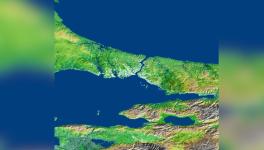Three Years of Syriza Government in Greece: A Saga of Stunning Capitulation

Cartoon: 'Alexis Tsipras on a short leash from the EU'. Credits: DonkeyHotey on Flickr
It's been three years since Syriza, the 'Coalition of the Radical Left', came to power in Greece. The party had cruised to victory in elections on the back of massive protests against the austerity measures that were being implemented in the country ravaged by the worldwide economic crisis.
But three years after Syriza’s Alexis Tsipras became Prime Minister, there has been a deepening of the very policies that Syriza had promised to end.
Things have come to such a pass that French left leader and former President candidate Jean-Luc Mélenchon has called for Syriza to be thrown out of the Party of the European Left, an association of several socialist and communist parties in Europe.
Dramatic rise followed by betrayal
Syriza first came to power in the January 2015 elections in Greece, promising an end to crippling austerity measures which were sowing misery in the country. Greece has been roiled by deep economic crisis since 2007. Between 2007 and 2014, its GDP had contracted by 26 per cent, which was worse than the contraction of the US economy during the Great Depression. Unemployment in the country rose from 10.7 per cent in 2001 (the year when Greece adopted euro as its currency) to 26.5 per cent in 2014. The country also faced a debt crisis – its Debt-to-GDP ratio reached 179 per cent in 2014 from 111 per cent in 2008. The worldwide economic crisis hit the country hard, and as the size of the economy contracted and public debt didn’t, the Debt-to-GDP ratio went up steeply.
As foreign banks, mainly German and French banks, faced the threat that Greece would default on their loans, various European governments, the institutions led by them and the International Monetary Fund (IMF) lent money to Greece to help it repay the loans. In the subsequent negotiations between the Greek government and the creditors who lent to the country, the creditors were represented by the “troika” of the European Commission (EC), European Central Bank (ECB) and the IMF.
In return for continued credit to the country, the troika insisted that Greece implement a flurry of austerity measures. The governments which ruled Greece in this period accepted these conditions, and cut down public sector jobs, privatised public sector enterprises, imposed cuts on public services and pensions, and increased Value Added Tax (VAT). As a result, wages fell by 37%, pensions were reduced by 48%, and government employment was cut by 30%. The biggest victims of these policies were the weakest sections of the population, such as the poor, the unemployed and senior citizens. The average purchasing power of the Greek people reached the level it was in 1986, and yet the troika insisted on further “belt-tightening”.
It was the tidal wave of popular anger against these policies which brought Syriza to power in 2015. The party promised that austerity measures would be ended and that repayment of public debt would be postponed till the country’s economic situation improves.
But soon the party diluted its own promises, in the face of threats by the troika and capital outflows which threatened to wreck the economy. The Syriza government put forward, on its own, proposals that included further privatisation and cuts in social security. But the troika rejected it, and put forward another, brutal, austerity deal demanding more flesh. The government responded by putting these proposals before the Greek people, in a historic referendum on 5 July 2015. In the referendum, 61% of the people voted against the austerity deal which the troika wanted to thrust upon them.
The referendum results energised progressive-thinking people all over the world, and added strength to the hope it might be possible to put an end to the austerity policies which immiserised people, not just in Greece, but all across Europe. The question was whether Syriza would show the boldness to avoid abandoning its own programme, and whether it would put the lives, livelihoods and dignity of the Greek people above staying in the eurozone.
The immediate challenge here was that the EC-ECB-IMF troika and the ruling classes in Europe could not be expected to respect democracy. They have had a notorious disdain towards democratic mandates, having called for repolling whenever referendum results in various countries went against the interests of the ruling elite. If the troika refused to agree to allow Greece to end austerity and to postpone its debt payments, as could be reasonably expected given the history of the European institutions, Greece could end austerity only by walking out of the eurozone and the European Union. (See this for a detailed explanation of why a country would find it impossible to put an end to neoliberal policies while staying in the EU.)
But what followed was stunning. Just five days after the referendum, the Syriza government proposed an austerity package with precisely the same proposals which the people had rejected. The bailout package was passed in the Parliament, with the major Left opposition to it coming from the KKE (the Communist Party of Greece) and a section of Syriza itself.
Syriza’s capitulation was inevitable, given its commitment to keeping Greece within the eurozone at all costs. As long as the option of ‘Grexit’ from the eurozone and the EU was ruled out, the troika maintained its iron-grip which allowed it to ruthlessly impose its will on country.
The betrayal by Syriza triggered the exit of a section of the party – 25 MPs who rejected the terms of the bailout package formed a new party, Popular Unity. With the government losing majority support in Parliament, Tsipras called for snap elections in September 2015. Syriza won the elections again with fewer seats, prompting it to forge an alliance with the right-wing party ANEL (Independent Greeks) in order to form a coalition government.
Neoliberal policies have proceeded apace under the Syriza-ANEL government, with more privatisations and undermining of social security.
Greece handed over control of 14 regional airports to German airport operator Fraport in April 2017 for 1.2 billion euros. The Port of Piraeus, the largest seaport in the country, was privatised in August 2016, in spite of stiff resistance by the workers. A deal for the privatisation of the Thessaloniki seaport, the second largest in Greece, was signed on 2 February 2018.
Pensions, which have been cut by 40%, are scheduled to be cut by another 19% as of 2019.
Unemployment remained sky-high at 23.6 per cent as of 2016, and the percentage of people employed part-time went up from 23.1 per cent in 2015 to 26.4 per cent in 2016, indicating a worsening of the quality of employment.
With cuts in government expenditure dragging down aggregate demand, GDP growth also continued to be in negative territory, with the economy declining by 0.29 per cent and 0.24 per cent respectively in 2015 and 2016.
Syriza, which in the past had taken the position that Greece should exit the NATO, ended up deepening the country’s engagement as part of the military alliance – it provided, for instance, military bases to facilitate NATO’s wars on Iraq, Libya and Syria. The party which once wanted Greece to cut military ties with Israel has presided over the strengthening of military collaboration with the Zionist state.
The latest move by the Greek government to push through a law to restrict the right to strike has angered workers in the country further. The measure, which has been described as “the most anti-union legislation in Europe” was demanded by the troika as a condition of the latest tranche of the bailout package for the country. Large protests and strikes have taken place in Greece against the new law, under which “industrial action would require a yes vote from more than half of the total number of union members in a workplace, regardless of the actual turnout”.
The road ahead for those in Greece fighting against crushing austerity, attacks on workers’ rights and mindless cuts on social security seems to be long and arduous.
If there is one lesson to be learned from the experience of Syriza and Greece, it is this – the end of neoliberalism cannot be negotiated with finance capital. It has to be won through people’s power, and carried through against the will of the ruling classes.
Get the latest reports & analysis with people's perspective on Protests, movements & deep analytical videos, discussions of the current affairs in your Telegram app. Subscribe to NewsClick's Telegram channel & get Real-Time updates on stories, as they get published on our website.
























